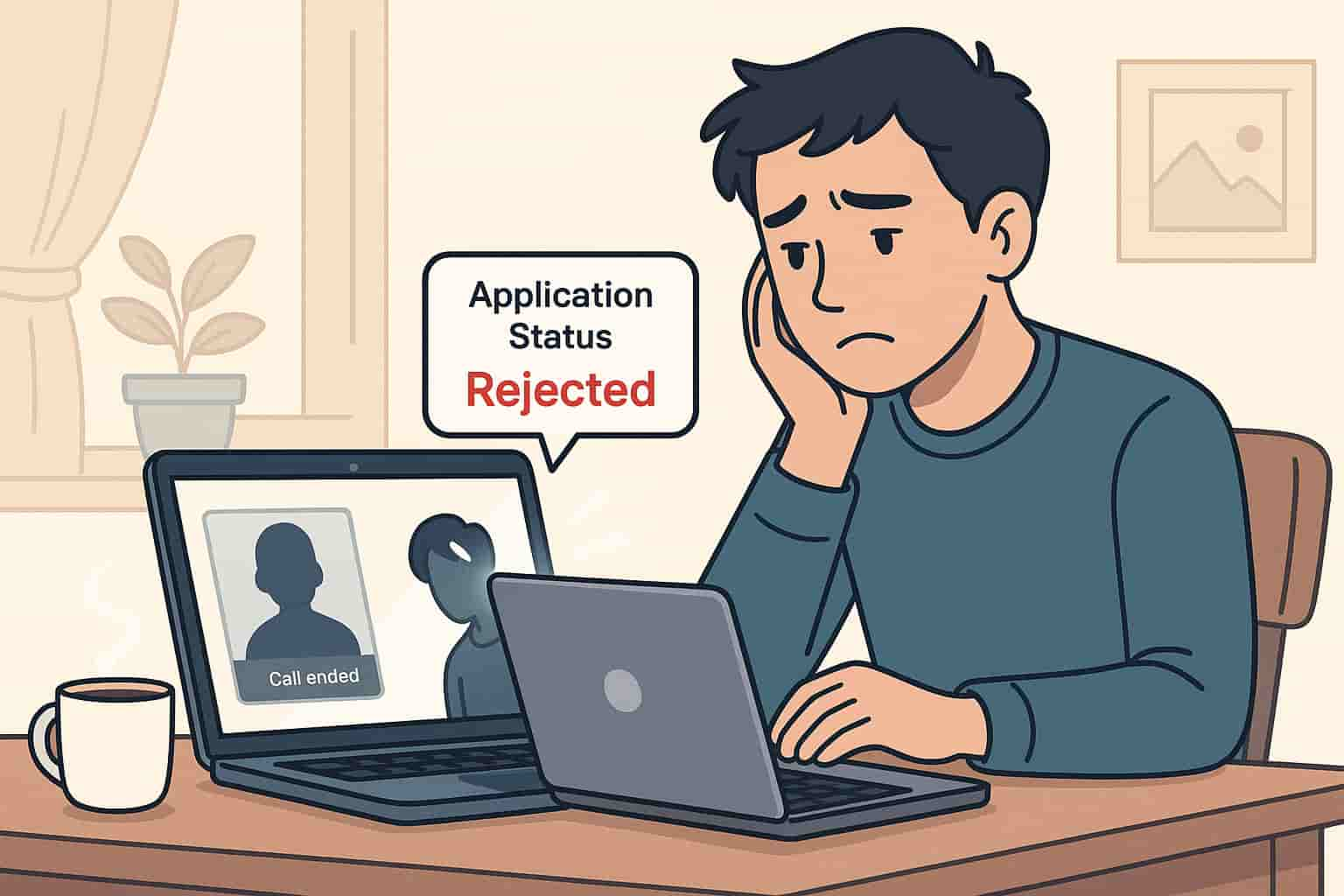How I Found My First Web Developer Job in Japan Without Speaking Japanese
When I first arrived in Japan as a Master’s student in Computer Science, I knew job hunting here would not be easy, but I didn’t realize just how challenging it would be. I had heard many stories from other international students about the hurdles: the traditional rirekisho (Japanese resume) format that requires precision, the highly structured application process, and the pressure to prove Japanese language ability with tests like JLPT N2 or N1.

In my case, the process stretched far longer than I expected. Despite sending out countless applications and attending career support sessions at my university, I struggled to get positive responses while still studying. After months of persistent effort, I finally secured my first full-time web developer job in Japan just 10 days before my graduation ceremony.
Looking back, my journey was filled with rejections, small breakthroughs, and moments where I nearly lost confidence. But it also taught me valuable lessons about perseverance and about how Japan’s job market truly works for foreigners. In this post, I want to share my real story, how I relied on university guidance, online job portals like Indeed, and most importantly, persistence—to finally land that first opportunity. I hope my experience can help other foreign students, especially those in tech, who are preparing to start their own job-hunting journey in Japan.
The Japanese Job Hunting System: A Tough Start
Job hunting in Japan is very different from what I had experienced back home. In many countries, you can apply for jobs year-round, whenever companies have openings. But in Japan, there is a structured cycle called “shūkatsu” (就活), where most companies recruit new graduates at fixed times of the year. This means students often begin preparing and applying almost a year before graduation, sometimes even earlier.
On top of that, the process is extremely formalized. Companies expect applicants to submit a traditional rirekisho (Japanese resume), which must be written in a very specific format. It includes details like age, address, and even a passport-style photo. Mistakes as small as a wrong date format can make your application look careless. Then there are the interviews, where etiquette matters as much as your answers—how you sit, how you bow, and even how many times you knock on the door before entering.

At my university, we had weekly job-hunting training sessions to prepare us for all this. Looking back, those sessions were intense but incredibly valuable. We started with the basics how to fill out a rirekisho by hand, how to write a proper self-introduction (自己PR), and how to explain our motivation for applying to a company. Later, the training moved on to body language and manners. We practiced bowing at the right angle, greeting interviewers politely, and maintaining the right posture when sitting down. Even something as simple as how to place your bag during an interview was covered in detail.
For me, with almost zero Japanese language skills at the time, the whole process felt overwhelming. In our training sessions, we were all international students—some classmates already had good Japanese skills, while others, like me, were just starting out. That mix actually made the sessions both encouraging and challenging. I could see how those with stronger Japanese were able to follow the instructions more smoothly, while I had to put in extra effort just to keep up with the basics.
Still, I kept attending every session, and slowly I began to understand that these workshops weren’t only about memorizing manners or learning how to bow correctly. They were about understanding the deeper mindset of Japanese companies: the importance of humility, respect, and consistency. Even though I couldn’t speak fluent Japanese, just showing my willingness to learn these cultural expectations gave me more confidence. It reminded me that effort itself is highly valued in Japan—and that persistence would eventually pay off in my job search.
Starting My Own Job Search
Even though the university’s job-hunting training sessions were extremely helpful, I realized early on that the traditional Japanese route might not work for me. Many of my classmates were preparing for the official “shūkatsu” (就活)cycle, attending company seminars, writing dozens of rirekisho, and aiming for big-name corporations. But I had two clear disadvantages that made me rethink that path:
- Almost no Japanese language skills: With my JLPT level close to zero at the time, I couldn’t compete directly with students who could already handle interviews and essays in Japanese.
- A different background: I wasn’t a “fresh graduate” in the typical sense. I was a foreign CS student with some prior work experience in web development, and that didn’t fit the mold of what many Japanese firms were looking for in new hires.
So instead of waiting for the next recruitment cycle, I decided to start applying on my own well before graduation, around six to ten months earlier. I knew my weak Japanese would make the traditional route difficult, so I wanted to test whether there were companies that valued technical skills over language ability. During this period, I spent hours every week searching through Indeed Japan, exploring other job portals for foreigners, and polishing my LinkedIn profile to highlight my programming background.
My applications were straightforward. I didn’t try to “force” them into the Japanese style. Instead, I focused on what I could genuinely offer: programming skills, small but real web development projects, and the adaptability I had gained through my past work experience. I wrote cover letters that were short and honest—emphasizing that while my Japanese was weak, I was motivated, hardworking, and ready to contribute from day one on the technical side.
In the beginning, sending out applications felt pointless, as if they simply vanished without a trace. I would apply to ten or fifteen companies in a week, often without receiving any reply. But I kept at it because deep down, I believed there had to be at least some companies in Japan that cared more about coding skills than language proficiency. This persistence was the start of my own job-hunting path—different from the traditional route, but one that eventually worked for me.
Rejections, Struggles, and Persistence
I won’t sugarcoat it, my job-hunting journey was full of rejections. Some companies rejected me immediately after seeing my resume, usually with a polite but generic email saying they required JLPT N2 or higher. Others didn’t even bother to reply at all, leaving me wondering if my application was even read.

Most of my interviews during this period were conducted online—mainly through Zoom or Google Meet. Sometimes I felt the conversations went well, and for a moment, I believed I had a real chance. The interviewers would nod, ask about my projects, and seem genuinely interested in my technical skills. But then, a few days later, the rejection email would arrive: “Thank you for your time, but we have decided to proceed with other candidates.” Those were the toughest moments because I felt like I was so close, only to have the opportunity vanish after the screen went dark.
My very first physical, in-person interview in Japan was actually with the company that eventually hired me. Until then, everything had been remote. Walking into that office, shaking hands, and seeing the environment in person made everything feel real. It was nerve-wracking but also gave me more energy to prove myself. Looking back, that final face-to-face meeting was the turning point in my journey.
Still, all the online rejections taught me something valuable. Each “no” forced me to refine my approach—making my resume clearer, emphasizing my technical stack (PHP, JavaScript, MySQL, node, react), and showcasing my projects more effectively. And more importantly, they taught me resilience. If you’re going through the same struggle, here’s the truth: in Japan’s job market, rejection is normal, but persistence is what eventually opens doors.
The Breakthrough: My First Offer
After months of sending applications and facing rejection after rejection, I finally received a reply that felt different. A company was genuinely interested in me for a junior web developer role. From the very beginning, their focus was on my coding ability rather than my lack of Japanese, and that gave me hope.
The first part of the process was online. Unlike so many of my earlier interviews, this one felt meaningful. The questions were practical, centered around my projects, technical decisions, and problem-solving approach. For once, I felt like I was being evaluated for what I could actually do, not for what I couldn’t.
Then came the invitation to visit their office in Nagoya for an in-person interview. Traveling from Kyoto to Nagoya that day, I carried both nerves and excitement with me. It was the first time I would meet a potential employer face-to-face in Japan, and I couldn’t stop thinking that this might be my breakthrough moment.

Inside the office, the conversation went deeper. We discussed not just my technical skills but also how I work in a team, how I approach new challenges, and why I wanted to build a career in Japan. After several back-and-forth discussions, I could feel the mood shift, the company was convinced. Finally, the discussion moved on to salary expectations, working style, and the overall terms of the job. That was the moment I knew things had changed: after all the struggles, I was no longer just “a candidate” being tested-I was someone they truly wanted to hire.
A few days later, the official confirmation came by email. I had my first job offer in Japan. The sense of relief and happiness in that moment is hard to describe—it felt like all the effort, rejections, and doubts had finally been worth it.
Advice for Foreign Students in Tech
Looking back at my own journey, I realize that job hunting in Japan as a foreign student in tech requires a mix of strategy, persistence, and self-awareness. It’s not easy, but it is absolutely possible. Here are the lessons I learned that I think will help anyone in the same situation:
-
1. Focus on your technical skills.
Your programming ability, problem-solving approach, and hands-on project experience are your biggest assets. Japanese companies may care about language, but in tech, your skills often speak louder. Make sure your resume and portfolio clearly show what you can build list programming languages (PHP, JavaScript, Python, etc.), frameworks you’ve used, and even small personal projects. A GitHub profile or portfolio website can give you an extra edge. -
2. Use global platforms, not just“shūkatsu” (就活)
Traditional Japanese recruitment focuses on fresh graduates who fit a narrow mold. For international students, it’s often difficult to match the narrow criteria of the traditional system. Instead, rely on platforms where companies specifically look for international talent: Indeed Japan, LinkedIn, Glassdoor, and specialized boards like the job portals I listed here. These platforms often have companies that are more flexible with language requirements. -
3. Apply widely and don’t take rejection personally.
You will get rejected—a lot. Sometimes without explanation. Sometimes even after interviews that felt positive. It’s frustrating, but rejection in Japan’s job market is part of the process. My own journey taught me that each “no” is not a dead end but a filter leading you toward the right company. Think of it as a sorting system: you don’t need every company to say yes, you just need one good match. -
4. Leverage your university’s support systems.
Even if you choose a path outside the traditional Japanese job-hunting process, make sure to make use of the support your university offers. Career centers, weekly workshops, and mock interviews are incredibly useful. In my case, practicing how to write a Japanese-style resume, learning body language, and understanding how companies expect candidates to behave gave me confidence—even though I eventually found my job through a different route. These resources exist to help you, so take advantage of them. -
5. Look for companies that already hire foreigners.
Some companies in Japan are already used to hiring international staff, and those are often the best places to start. They understand the challenges of working with non-native speakers and usually have systems in place to support you. For a list of such companies, check out my post on Top Companies Hiring Foreigners in Japan. Targeting employers that are open to diversity will save you time and increase your chances of success. -
6. Don’t underestimate soft skills.
Technical ability gets you noticed, but soft skills—communication, teamwork, adaptability—help you succeed once you’re hired. Even if you can’t speak Japanese yet, show that you are willing to learn, can work with others, and are motivated to grow in the company. Employers value attitude as much as skill. -
7. Keep improving your Japanese step by step.
While I got my first job without Japanese, I quickly learned how important it is for long-term career growth. Even basic daily conversation (JLPT N4–N3) can help you integrate better into teams, and higher levels (N2–N1) open doors to management roles and higher salaries. Don’t let weak Japanese stop you from applying, but also don’t ignore the language completely—treat it as an investment in your future.
Final Reflection: My Journey
Job hunting in Japan was a little different for me as a foreign student of computer science with some prior web development experience. I actually began looking into opportunities about six to ten months before graduation, attending company sessions and joining the weekly job-hunting guidance programs at my university. At that stage, I wasn’t applying aggressively yet—I was more focused on learning the process and understanding what Japanese companies expected.
But as graduation came closer, I decided to take a more independent approach. Instead of relying only on the traditional system, I started building my own path: applying directly to companies through job portals, polishing my resume, and highlighting my programming portfolio. With almost no Japanese ability, I leaned entirely on my technical knowledge and small body of work. I applied to many companies, faced countless rejections, but eventually landed my first job as a web developer—without Japanese.

Looking back, I sometimes feel lucky. Many of my classmates, despite following every Japanese custom and submitting dozens of resumes, struggled to secure offers. Meanwhile, I found my opportunity because I happened to be in tech, where companies care more about coding than conversation.
Over time, I realized it wasn’t just luck—it was persistence, skill, and the willingness to step outside the standard system. Even today, I see companies in Japan actively searching for programmers who don’t speak Japanese but can deliver quality code. Some even place more importance on English certifications like TOEIC over JLPT levels.
My journey taught me this: in Japan, language is important—but skills open doors. If you are skilled, motivated, and patient, you can build your career here, even starting from zero Japanese.
